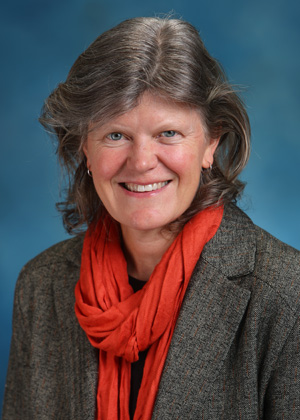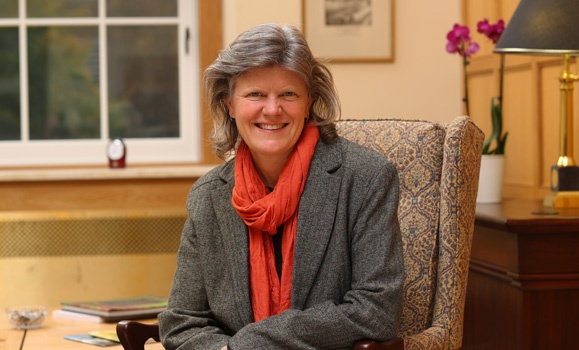This article is the first in a new series shining a spotlight on the personalities and priorities of Dal's senior leadership team. Look for more profiles in the weeks to come.
You can learn a lot from first impressions ‚ÄĒ which is good because, as she sits down for an interview on her first day at Ľ∆…ę÷Ī≤•, Teri Balser is overloaded with them. And she wouldn‚Äôt have it any other way.
‚ÄúThere‚Äôs a lot going on here at Dal ‚ÄĒ and a lot of great energy,‚ÄĚ says Dr. Balser, who arrived at Ľ∆…ę÷Ī≤• as the university‚Äôs new provost and vice-president academic on November 1.
"It’s really amazing to see how friendly and positive everyone is. It’s very welcoming, very forward-looking. Dal’s in its 200th year, but there’s more energy than you might expect in a 200-year-old institution."
From Australia to Halifax
Dr. Balser joins the Dal community from Curtin University in Perth, Australia, where she served as dean of teaching and learning and a John Curtin Distinguished Professor in the Faculty of Science and Engineering. Coming to the Atlantic Coast is a sort of homecoming for her, as she grew up in New England, also spending time in academia at the University of Wisconsin-Madison and the University of Florida.
Though her academic background is as a scientist (she has a PhD in soil microbiology), she says she’s always approached her work with a people-focused spirit that made university administration a logical step.
‚ÄúI‚Äôm an academic at heart that actively chose administration in order to support universities and higher education,‚ÄĚ she says. ‚ÄúI realized early in my career as a scientist that I was quite fascinated by people, and that so much of the success of the work that I was doing was dependent on whether people were buying into it, whether the science was being communicated well, whether the students were understanding it. For me, that realization was kind of a pivotal moment.‚ÄĚ
Leadership for Dal's academic community
As Provost, Dr. Balser serves as Dal’s senior academic leader. She aligns university budget and plans with the academic mission of the university; ensures goals are integrated across both academic and administrative units; and provides a structure to enable clear and efficient decision making. The deans report to the provost, as does the university librarian, two vice-provosts (students affairs and planning & analytics) and the associate vice-president academic.
‚ÄúThe Provost acts as a coordinator or bridge among all the different parts of the university,‚ÄĚ Dr. Balser explains. ‚ÄúIt‚Äôs ultimately a people-focused role: it‚Äôs about ensuring that the conditions and culture are there so everyone can do their job well, have us moving in the same direction.‚ÄĚ
People can expect to hear more from Dr. Balser as she gets to know the Dal community ‚ÄĒ and she wants to hear from you as well. asking for people‚Äôs thoughts, hopes ideas or concerns about the university, welcoming any and all input.
Survey:
‚ÄúI truly believe we are better collectively than any one of us alone,‚ÄĚ she says. ‚ÄúWhen we can tap into the creativity and brilliance of the people we‚Äôve hired across the university, it works so much better. I really see leadership in that way ‚ÄĒ¬†you don‚Äôt lead from the top down, you lead by engaging, by listening and then doing the work.‚ÄĚ
 On people-focused leadership…
On people-focused leadership…
‚ÄúI really do believe that if you take care of the people, the rest will follow. Too often we focus on the doing and the stuff and the details ‚ÄĒ we forget that it‚Äôs really about the people.‚ÄĚ
On higher education in the 21st century…
‚ÄúThe world is changing very quickly, and the challenges to higher education are coming at us quickly as well. It is ‚Äúmassified and diversified:‚ÄĚ we have more students in our classrooms, and coming from a wider range of backgrounds. The university environment is more heterogeneous than it used to be. The pace of change in terms of global engagement and internationalization is so fast and universities don‚Äôt always move as quickly as industry and the rest of the world does.
‚ÄúI have a real interest in and a passion for higher education, and I worry about trends that result in a more corporate attitude about higher education. I don‚Äôt want to see us lose the aspects of being an academic and being a student in a university that are so valuable. They aren‚Äôt always tangible, they aren‚Äôt always easy to determine. But they are absolutely critical.‚ÄĚ
On her hobbies…
‚ÄúI grew up playing and performing music since I was 10 years old. I play saxophone, flute, clarinet. I‚Äôve played in jazz and big bands and orchestras, but I also play early music with recorders, so I‚Äôm actually really excited about getting involved in the Nova Scotia Early Music Society.‚ÄĚ
‚ÄúI‚Äôm also a total geek, and love the genre of fantasy and science fiction. I love how we are freed to speculate on the moral and ethical dilemmas facing us when we remove ourselves from the expectations of the ‚Äúknown‚ÄĚ world and create worlds of experimentation. Our best authors do this brilliantly. Isaac Asimov, J.R.R. Tolkein, Ursula K. LeGuin, Stephen R. Donaldson, Orson Scott Card, and so many others ‚Äď both newer and older.‚ÄĚ
Five Questions  
When you were a student, what was your favourite course?
All of them! I was such an academic nerd. I loved my natural sciences, ecology, and geology classes especially. I’ve always loved the outdoors and natural world. That’s part of why I’m so pleased to find myself in Halifax now.
If you were to leave academia and go into any career you wanted, what would you choose?
Honestly, I can‚Äôt imagine leaving academia. I‚Äôm such a geek, and I am grateful for the career I have. But let me try. Once I wanted to be veterinarian ‚ÄĒ I love animals! But now? I love architecture, and can imagine that as an alternative. Or perhaps ‚Äď and probably more likely ‚Äď I‚Äôd do environmental sociology. I am fascinated by people, and am committed to environmental and social sustainability. As an environmental sociologist I might be able to help in that space.
What’s the best advice you’ve ever received?
Someone once told me: ‚ÄúYou will never know what chocolate ice-cream tastes like to another person.‚ÄĚ And it is so true. We all each have our own experience. Our reality is uniquely our own. There is humility in remembering that. It reminds me to be curious about the experience of others, and to never assume that theirs is the same as mine.
Who is a mentor or leader that’s inspired you in your life or career?
I have been drawn to people who are humanitarian, and bold and visionary. Who stand up for what they believe, despite all odds. So many inspirational people. There‚Äôs the ‚Äúusuals‚ÄĚ: Gandhi, Mother Teresa, Martin Luther King Jr., Nelson Mandela, Aldo Leopold‚Ķ But just as much, there are people like Mike Crow, the president of Arizona State University who has done amazing innovative things in higher education to make education affordable and accessible. And Parker Palmer, Quaker, author, and founder of the Center for Teacher Formation ‚ÄĒ whose enormous huge compassionate heart enfolds and improves us all.
If you could have dinner with one person ‚ÄĒ living, deceased or fictional ‚ÄĒ who would it be and why?
There are so many people I admire and would love to meet‚Ķ for different reasons. People I admire from a distance. People with courage and bravery. I‚Äôd love to ask them what it took, and simply shake their hand and tell them ‚Äúthank you‚ÄĚ for their lives and their work. Barack Obama, Abraham Lincoln, MLK Jr., Gandhi, Nelson Mandela, Parker Palmer. But in the end, what I‚Äôd like more than anything would be one more day with my best friend and mentor Tom Christensen. One more dinner. He left us too soon, and there is so much that I still want to ask him, and so much that‚Äôs exciting or crazy about the world today. I want to tell him all about it, and hear his opinions and advice. He was a thought leader in the world, and he was my friend, and I miss him.

